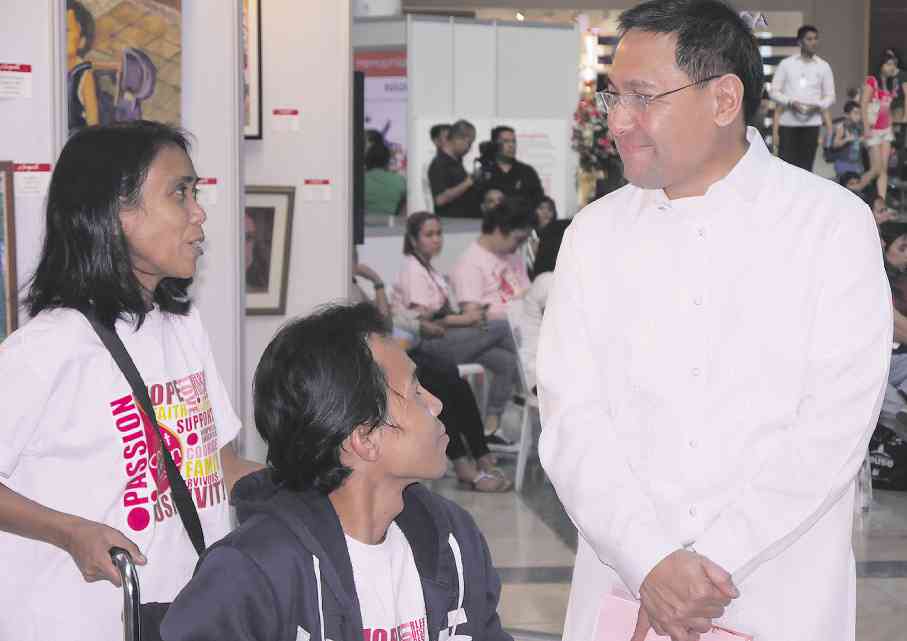Fighting rare blood disorder by raising public awareness
If you love working in the kitchen or playing sports like mountain biking, you probably know about knife accidents as well as banged-up knees and elbows. But for people with a rare bleeding disorder called hemophilia, what might seem like minor cuts or bruises can be a big deal.
As a genetic disorder, hemophilia prevents blood from clotting properly, so a person who has it bleeds profusely after injury, surgery, trauma or even menstruation. Sometimes the bleeding is spontaneous and without a known or identifiable cause.
Such bleeding, if it happens in joints and muscles, could cause severe pain and disability. Bleeding occurring in major organs, such as the brain, can lead to death.
“Treatment for bleeding in hemophilia patients is very costly. Which is why we at the Department of Health are doing our best so that hemophilia and other bleeding disorders will be included in the Z Benefit Package,” said Health Undersecretary Vicente Belizario during last week’s gathering of hemophilia patients and their families at the Glorietta in Makati City.
High cost of treatment
The announcement was lauded by members of the Hemophilia Association of the Philippines for Love and Service (Haplos), the national membership organization of persons with hemophilia and other bleeding disorders, who said that treatment for minor bleeds such as those occurring in the joints could cost around P30,000 to P50,000 per day.
“Serious bleeding such as those occurring in the gastrointestinal tract or the brain could reach hundreds of thousands to millions of pesos,” said Haplos president Ric Felipe, who himself has hemophilia.
The Z Benefit Package, which is offered to PhilHealth members, currently addresses health conditions that trigger prolonged hospitalization and very expensive treatments. Conditions included under type Z are usually cases “perceived as economically and medically catastrophic” due to their seriousness.
Belizario said the planned inclusion will not only include hemophilia but also von Willebrand Disease and other inherited bleeding disorders.
“The inclusion would be very beneficial for the more than 1,200 patients registered as having this condition. However, according to the World Hemophilia Federation, there could be around 10,000 Filipinos affected by hemophilia and around one million more with von Willebrand Disease and other bleeding disorders.
Last week’s two-day event, dubbed “Count Me In,” was organized to hopefully seek others who also suffer from these conditions and are still unaccounted for, said Felipe.
“Many patients die because they do not know they have a bleeding disorder, could not afford the high cost of treatments or they do not have access to treatment at all,” Felipe lamented.
Low awareness
Despite being considered as serious and lifelong conditions, awareness for hemophilia, von Willebrand Disease and other bleeding disorders remain very low.
In fact, 35-year-old Marvin Valladolid, who attended last week’s event only found he has severe hemophilia two weeks ago. “I’ve been in and out of the hospital for the past three years. At first, they said I had von Willebrand. However, when I recently sought the help of Haplos, I was advised to go to the National Kidney and Transplant Institute. There, I was accurately diagnosed to have severe hemophilia.”
Unfortunately for Villadolid, the delay to accurately determine his condition crippled him already. “The World Hemophilia Day is an opportunity for the bleeding disorder community to come together, speak out, and focus on the need for everyone to be aware about the existence of this condition and in the end, improve and maintain treatment. I do not want others to experience what I went through.”
“Count Me In” lead campaigner Andrea Echavez added that the event was also aimed as a call to action to those with hemophilia, von Willebrand Disease and other bleeding disorders to be more active and be included in the National Hemophilia Registry. “By knowing our numbers, the government, doctors and other organizations like ours could strategize more on a way forward in addressing our concerns,” said Echavez.
A person or parents of a suspected child should watch out for these signs and consider seeing a doctor: bleeding for no known reason; nosebleeds; prolonged bleeding from cuts, tooth extraction and surgery; bleeding that does not stop after circumcision; or bleeding into a joint, which can cause tightness, swelling and pain.
